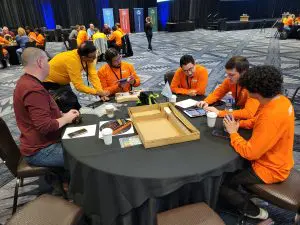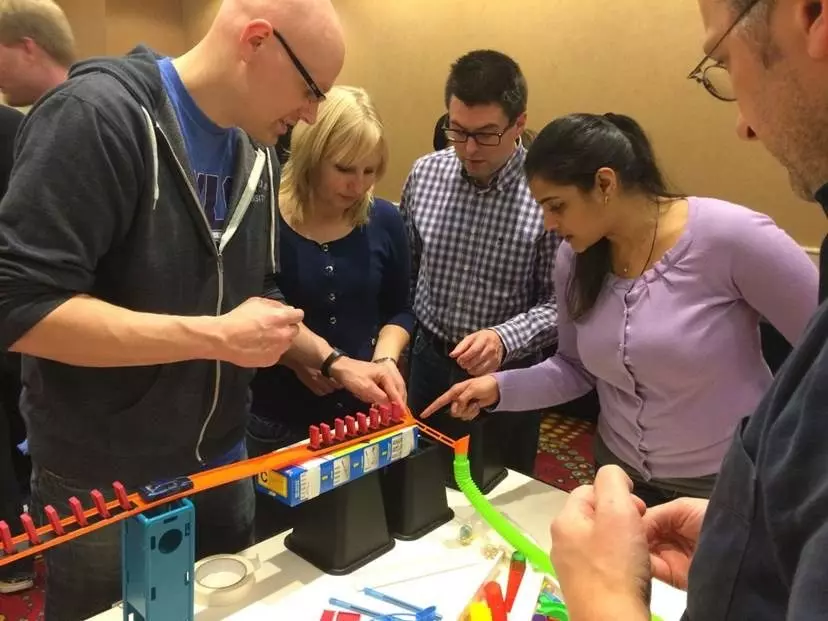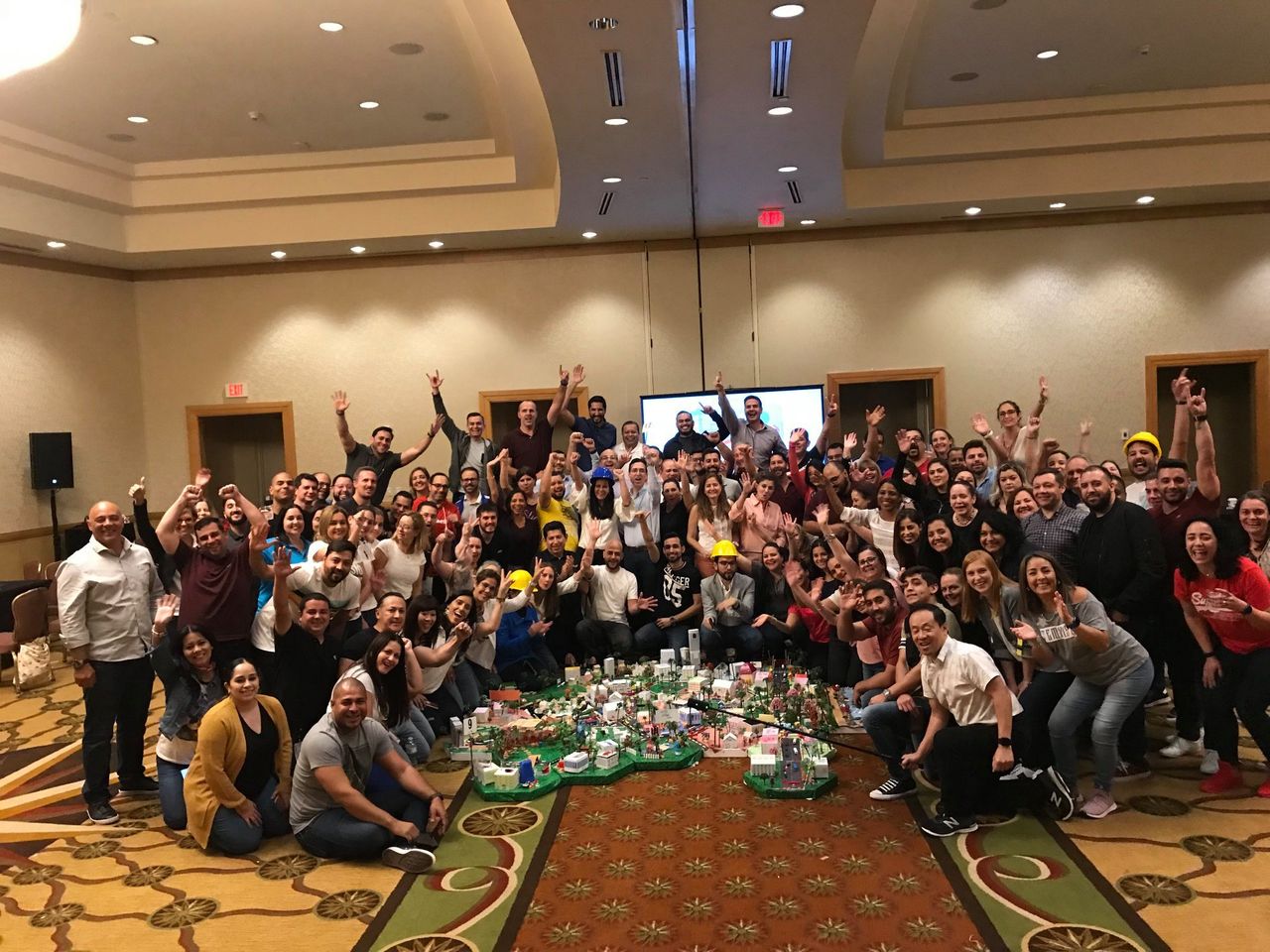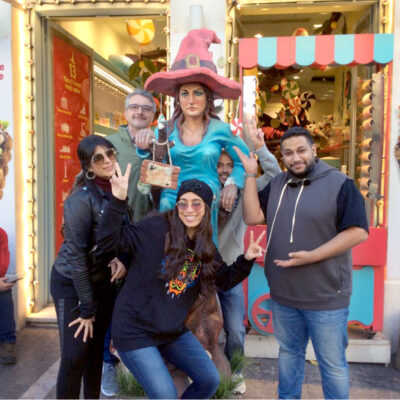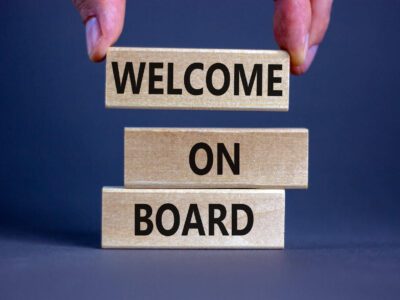Team building has been around for decades, but as teams have gone remote and hybrid, is it really necessary to maintain employee connections? Absolutely!
Team building in the workplace is more than just fun and games—it’s a necessary tool that has many invaluable effects on employee productivity and engagement.
As the founder of TeamBonding, I’ve seen firsthand that team building isn’t just a nice-to-have—it’s the cornerstone of collaboration, creativity, and camaraderie in the workplace. Let’s explore the definition of team building and why it’s one of the smartest decisions you can make for your employees and company.
What Is Team Building?
Team building is the process of creating a team that cohesively works together towards a common goal. It involves activities, exercises, or events designed to enhance communication, trust, and problem-solving skills while promoting a sense of shared purpose and camaraderie.
Team building can take many forms, from structured workshops to more informal gatherings like happy hours or corporate game shows.
Why Is Team Building Important?
Before we dive deeper, let’s tackle a common question about team building: “Why is it important?”
Team building helps people see each other in a different light and connect outside of their usual work setting. In many companies, departments operate in silos, limiting interaction between employees.
Team bonding activities provide a great way for everyone to connect and find a greater sense of common ground within an organization, both in and outside of their departments.
A key reason why companies invest in team building programs is simple: results. Through a series of fun and motivational team building events, teams improve essential skills like communication, planning, problem-solving, and conflict resolution.
Common Misconceptions About Team Building
The importance of team building is often underplayed by leaders who’ve never experienced its positive impact on employee connection and engagement.
One of our event facilitators, Kevin Pertusiello, shared some fantastic insights into many people’s opinions about team building experiences:
“There are still so many companies out there that have not tried team building that are just unsure because it’s unknown to them, and they’re just trying it out. And we win them over just about every single time.
“Sometimes people have in their head that it’ll be corny or people are going to drag their feet, but that’s not what we do. Because if that’s what we were doing, we wouldn’t want to do it either.”
Despite initial hesitation, I’ve found that even the most distant teams can find success when they invest in team building—meaning they cultivate better teamwork, boost morale, enhance leadership qualities, and so much more.
Effective team building is more than cheesy trust falls and awkward icebreakers. Modern methods are designed to engage and challenge in meaningful ways—not make you cringe.
15 Reasons Why Team Building is Important
Team building is a key part of corporate culture. When people choose where they want to work, they’re not just looking at salary and benefits but also the environment they’ll be working in—team building plays a big role in that.
A strong company culture fosters collaboration, boosts morale, and ultimately contributes to a company’s success. It attracts the best employees, showcases a fun workplace, and reinforces a sense of belonging. Work shouldn’t be all about deadlines and meetings. A balanced approach—where teamwork and enjoyment are encouraged—creates a thriving, motivated workforce.
Here are 15 key reasons why team building is essential for your employees and your company:
- Facilitates Socialization and Networking for the Greater Good
- Boosts Team Performance
- Promotes Adaptability and Reduces Stress
- Increases Team Spirit and Fun
- Sparks Innovation and Creativity
- Builds Trust Among Team Members
- Cultivates a Positive Company Culture
- Strengthens Problem-Solving Skills
- Demonstrates Employee Appreciation
- Bridges Gaps Between Departments
- Unlocks Leadership Potential
- Connects Teams Across All Levels
- Enhances Employee Engagement and Morale
- Increases Retention and Job Satisfaction
- Makes Conflict Resolution Easier
Now, let’s explore each of these benefits in more detail below.
1. Facilitates Socialization and Networking for the Greater Good
Socializing and making friends at work is one of the best ways to increase productivity in the virtual, hybrid, or in-person workplace.
According to Gallup, having a best friend at work has become more important since the start of the pandemic. Employees who have a best friend at work are much more likely to:
- Engage customer and internal partners
- Be more productive and time-efficient
- Support a safe workplace with fewer accidents and reliability issues
- Innovate and share ideas
- Have fun at work
Participating in team building programs together helps team members discover what they have in common with each other, so they find trusted colleagues and common ground.
Team building also increases engagement in the office and helps virtual teams solve challenges more quickly.
This is because team members become more comfortable approaching coworkers with questions and concerns as they arise rather than waiting for answers from managers or avoiding conflict altogether.
Our CSR programs make people feel proud of the company they work for. They can work together for the greater good and help in ways they wouldn’t be able to help as individuals. This goes a long way toward helping team members bond with each other.
2. Boosts Team Performance
Team building activities boost communication and help teams better understand each other. Oftentimes, employees aren’t fully leveraging their unique talents within their roles.
Teamwork activities can help employees identify their own strengths within a team, as well as the strengths, weaknesses, and interests of their coworkers. This helps teams seamlessly work together and find the best people for the best jobs.
Each team is different, and every individual has something unique to contribute. Once you can identify and encourage everyone to reach their individual potential, your team will be able to reach its collective potential.
3. Promotes Adaptability and Reduces Stress
While they may seem like all fun and games, team building activities help employees become more resilient, adaptable, and willing to embrace change. Whether it’s the introduction of new technology, new coworkers, economic challenges, or other factors, the workplace is always evolving, and employees must have the skills to adapt to change.
Especially as economic uncertainty brings organizational changes, you’ll need the tools to align your team, work through possible resistance to change, and show your employees you care about their wellbeing.
Team building allows employees to gain the confidence to adapt to change by promoting continuous learning and providing a direct line of communication with leadership during these activities. I’ve personally found that getting together with my team helps them see the bigger picture and grow more comfortable as we navigate new stages of the business.
While any team building program will help employees relieve stress, our Change Management program is a great option for teams to develop those essential skills to tackle change head on.
4. Increases Team Spirit and Fun
Have you ever worked somewhere with no team spirit or fun? Where everyone stays in their cubicles, completes their work, and then heads home without saying goodbye? This is all too common in workplaces without connection and camaraderie.
It’s a setting that feels like a collection of isolated individuals instead of a cohesive team. Over time, it can drain energy, creativity, and motivation, and work becomes just another routine instead of a chance to make an impact on other people.
Team building is a powerful way to energize your team, creating a ripple effect of motivation and positivity that bleeds into their everyday work. When work feels fun and rewarding, everyone wins and celebrates! The team that works together, wins together.
We’ve also found that team building can support employee mental health by providing a positive outlet for stress while fostering supportive relationships and friendly competition.
Friendly competition has been shown to increase productivity and performance. By channeling that increased productivity into a fun, inclusive team building activity, teams can bond more effectively than if they just hang out together or work side-by-side.
Learning to work well together can take some time, but you’d be surprised at how fast teams can come together when there is an incentive to win. Especially when they’re having fun with a team building program—they might even surprise themselves!
5. Sparks Innovation and Creativity
People tend to have a better imagination when they’re around people they’re comfortable with.
Successful team building events bring people closer together and contribute to a more creative workplace with enhanced psychological safety. This helps employees feel confident voicing their opinions and digging deeper than simple work small talk.
Continuous learning is a key part of innovative work cultures and can be easily incorporated into most team building activities. Professional development workshops offer the best of both worlds when it comes to team building and continuous learning.
Breaking Barriers, for example, helps employees work through their own insecurities in order to better understand themselves and their colleagues, cultivating a work culture that thrives on collaboration, respect, and collective creativity.
6. Builds Trust Among Team Members
It’s no surprise that the main reason people choose team building is to strengthen trust, improve communication, and enhance teamwork—these are all key ingredients for success.
Everybody wants a supportive work environment where they feel comfortable and can rely on their coworkers—not just a select few.
This trust also positively impacts business operations—in fact, 90% of employers believe fostering a sense of community directly influences a company’s success.
Most people picture old-school team building exercises when they think about the topic, but today’s methods are much more engaging and effective. They’re designed to help employees build genuine connections, deepen trust, and collaborate more seamlessly.
Team building events that align with your company’s values are a great way to strengthen trust and teamwork. Our Charity Bike Build is always a hit with all types of teams—it encourages collaboration while working toward a meaningful, shared goal.
7. Cultivates a Positive Company Culture
Company culture can be explained as the values, norms, goals, and attitudes that exist within your organization. Simply put, it defines the environment you work in and makes up the personality of the company.
According to iHire, more than 82% of Gen Z employees place a high value on workplace culture when looking for a new role. But unfortunately, almost a fifth of workers describe their current workplace as toxic.
Regularly scheduled team building events can help create a positive company culture and provide a space to understand your employees’ wants and needs.
Sometimes the culture of management doesn’t match up with that of the employees, so finding a middle ground is an important step in creating a more positive environment.
Team building activities help to cut out workplace toxicity and get everyone on the same page while working together.
8. Strengthens Problem-Solving Skills
Team building activities challenge employees to think creatively and work together to find solutions, enhancing their problem-solving skills in a fun and low-pressure environment.
Whether it’s an escape room, a strategy-based challenge, or a collaborative puzzle, these activities encourage teams to analyze situations, communicate effectively, and develop innovative solutions—skills that translate directly to the workplace.
By engaging in problem-solving exercises outside of their usual tasks, employees gain confidence in their ability to tackle obstacles, adapt to change, and work efficiently under pressure.
These experiences foster a problem-solving mindset that helps teams navigate challenges more effectively in their day-to-day work.
9. Demonstrates Employee Appreciation
Team building and activities that give your team a break from the day-to-day help show employees that they’re appreciated for their hard work. And this is essential for a happy workplace.
For instance, studies show that more than 50% of employees have left a job because they didn’t feel valued by their managers.
In many workplaces, great work can accidentally get swept under the rug due to a sea of other things going on. Prioritizing these events shows teams you care about them and appreciate their efforts, rewarding them with a fun activity they can enjoy together.
Team building activities can also be used as part of an employee incentive program to reward workers for a job well done, or can be held on a regular cadence so employees are always motivated to do their best work.
10. Bridges Gaps Between Departments
The connections between employees within a single department aren’t the only ones that matter when it comes to building a stronger team.
“Team” doesn’t have to be confined to the sales team or the marketing team—it’s a unified collection of all the working departments that make up your organization. Ask yourself, how well do you know employees in departments other than your own?
If the answer is not well or not at all, then team building will surely bring departments closer together to encourage cross-functional collaboration that will benefit your organization as a whole. Especially as layoffs and organizational restructuring become more common, companies should focus on bonding across all departments before a sudden change leaves employees working together with people they don’t quite understand.
Kevin shared some fantastic insights on the benefits of team building across departments that I think everyone should read:
“Every now and again, we’ll get called in to connect a team that had some kind of merger of companies or departments. And it may be two groups of people that really don’t trust each other.
“Whether that’s because of different histories, layoffs on one side, but not on the other side, things that a lot of times there’s just a lack of knowledge, and that fosters some issues when it comes to trust.
“So it’s our job to get people to the same table to see eye to eye. It’s letting go of titles and departments and saying, ‘We’re now on the same playing field.’”
Urge employees to familiarize themselves with people in other departments instead of working in a silo with members of their immediate team.
Bridging those divides allows for positive relationships to form, which leads to a more productive company.You’ll likely find that this practice helps everyone feel more comfortable, opening doors to new relationships.
11. Unlocks Leadership Potential
Most leaders are familiar with the benefits of upskilling: it reduces turnover, boosts productivity and engagement, and ultimately increases revenue.
But did you know that team building activities are great opportunities to spot employees with leadership potential? In a more relaxed and creative environment, you may find employees have hidden skills that haven’t been discovered in the office.
Leadership skills can shine in the simplest of activities. Regularly scheduled team building events can feed employees’ confidence in the workplace and help them discover their own skills.
You may learn that the quiet new employee is incredible at inspiring their peers and, with the right mentor, development opportunities, and encouragement, could be your company’s next rising leader. Consider creating a mentor program or leadership development program to help employees achieve their highest potential.
After each team building event, reach out to team leaders and request nominations for these programs based on colleagues who have stood out during these experiences. This is a surefire way to get everyone excited about the next team building event, too.
12. Connects Teams Across All Levels
Whether virtual, hybrid, or in-person, team building activities provide employees with meaningful ways to connect beyond work tasks.
These activities create a space for colleagues to engage in a more personal, informal setting, strengthening relationships and fostering deeper bonds.
As a result, teams—regardless of where they work—experience improved collaboration, communication, and overall team synergy in their daily interactions.
13. Enhances Employee Engagement and Morale
Committing to regularly scheduled team building events will encourage employees to step away from their work and have some fun, which then helps them return to their desks feeling refreshed, re-energized, and ready to work.
When employees feel valued and have opportunities to connect with their colleagues in a fun, low-pressure environment, they’re more likely to stay engaged, motivated, and invested in their work.
It all depends on which of our 200+ team building activities your employees enjoy. Find common interests among your staff and choose the programs that will give them the most enjoyment. When people aren’t working around the clock, they’ll actually get more work done because they’re more engaged and energized when they do work.
A thriving workplace isn’t just about productivity—it’s about creating an environment where people thrive! One where they feel valued, connected, and inspired to do their best work.
14. Increases Retention and Job Satisfaction
The job market is more competitive than ever, and retaining talented employees is essential. Team building plays a crucial role in creating an environment where people feel valued, connected, and fulfilled, which goes a long way toward improving retention.
Remember the statistic from earlier? A whopping 50% of employees have left a job because they didn’t feel valued! This statistic goes to show how important it is to foster genuine connection and a strong sense of belonging in the workplace.
It’s essential to meet the needs of your team members—they need to feel valued, fulfilled, and engaged while seeing a clear path toward advancement. And team building activities offer endless ways to make this happen.
At TeamBonding, we understand that every company has unique needs and messaging. That’s why all of our team building events can be tailored to sign perfectly with your company’s values and goals. Whether you’re introducing new initiatives, building skills, or simply strengthening team bonds, customized team building experiences ensure your message resonates while teams have fun together.
One great example is our Breaking News AI program, where teams use AI collaboration tools to create a fun, fictional news broadcast. If you’re introducing AI into your company culture, you might use this to inspire team members to embrace AI in their daily tasks.
We’re also happy to provide some team building suggestions if you’re not sure where to start or what you want to work on.
15. Makes Conflict Resolution Easier
When teammates develop a mutual respect for each other, it’s much easier to work through misunderstandings. Rather than writing off a coworker after a minor conflict, teams with regular team building activities are more likely to talk through issues and voice their concerns as they arise.
This eliminates unhealthy competition as well, since each person knows they hold a valuable space on the team. Team building, open communication, and transparent leadership are the secret ingredients to building a high-performing team.
Have your team flex their conflict resolution and collaboration skills in The Big Picture, a team building activity where teams groups work together to design tiles that combine into one gigantic mural. Teams will learn to see the company’s bigger picture as they collaborate to assemble their tiles.
Don’t Overlook the Importance of Team Building
Even the most talented employees won’t achieve success if they can’t work together. From connecting remote teams to developing future leaders, team building in the workplace is a no-brainer for business success.
Teamwork is a critical skill that’s often forgotten as we grow older. However, business leaders shouldn’t shy away from team building just because they’re unfamiliar with it or unsure how to plan the details of a team building experience.
At TeamBonding, we specialize in helping teams of all sizes connect and thrive. Explore our unique team building activities and get in touch today to start strengthening your team and driving business success!
